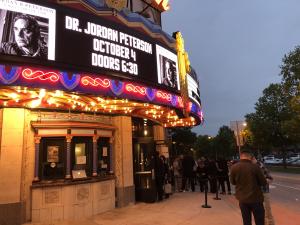 Jordan Peterson is far and away the most consequential public intellectual in America right now. Peterson’s book 12 Rules for Life has sold over 2 million copies; he draws over $80,000 of monthly support on Patreon; he is essentially a one-man movement, though he visits the mysterious back rooms of the Intellectual Dark Web as well. In an age when “diversity” typically means holding to one viewpoint, and “free speech” means shutting down evangelical campus groups, and “tolerance” means shouting politicians out of their preferred restaurant, Peterson has dared to resist the mainstream. For my humble part, I have praised him in no uncertain terms for doing so. Though many mock him and malign him, he has acted in bravery and spoken with erudition to defend free thought and the life of the mind.
Jordan Peterson is far and away the most consequential public intellectual in America right now. Peterson’s book 12 Rules for Life has sold over 2 million copies; he draws over $80,000 of monthly support on Patreon; he is essentially a one-man movement, though he visits the mysterious back rooms of the Intellectual Dark Web as well. In an age when “diversity” typically means holding to one viewpoint, and “free speech” means shutting down evangelical campus groups, and “tolerance” means shouting politicians out of their preferred restaurant, Peterson has dared to resist the mainstream. For my humble part, I have praised him in no uncertain terms for doing so. Though many mock him and malign him, he has acted in bravery and spoken with erudition to defend free thought and the life of the mind.
(By the way, I was recently interviewed by my friend Jason Dees about Peterson and whether evangelicals can profit from his work. Check out this fun podcast conversation if you like.)
Last night, Peterson’s speaking tour came to Kansas City. With Midwestern Seminary student Matt Neidig, I attended the lecture. It was a stimulating night, and like Peterson a sui generis experience. What follows are five surprising moments from the evening.
First, though you can’t see it in the photo I took above, the line to get into the lecture stretched for nearly three city blocks. You could see the shock on people’s faces as they registered just how long it was going to take them to get a place in line. This secured in my mind that Peterson is truly a phenomenon. I’ve never seen so many people pay very, very good money to hear a psychologist talk before. I can’t think of any intellectual–genuine intellectual–in my lifetime of whom this has been true. Peterson is singlehandedly reviving the Chautauqua model. Normal people used to turn out in droves to learn; now they devote that kind of attention to games, sports, social media, and superhero movies. On second thought, maybe this is a good thing; the life of the mind has gone punk. You’re now a rebel if you like thinking deeply, and Americans love rebellion more than almost anything.
Second, when the announcer told the audience that heckling was not allowed, the crowd roared its approval. That provoked an outbreak of applause and cheering from the crowd. When Dave Rubin came on to speak for a few moments before Peterson, Rubin said, “That is a first. No audience has ever cheered the “no heckling” policy before!” He was visibly taken aback by the audience’s enthusiasm. It struck me in that moment that here was a clear sign that normal American people have a visceral dislike for the bullying culture so prevalent in modern public life. I don’t mean that people wince when they see it; I mean they hate it. Woe to those who do not pay attention to normal American people. Wherever you land on any spectrum, you are liable to get blitzed if you do not pay attention to so-called “average” people. The “average” person thinks and knows a good bit more than the stereotypes often suggest. Be wary of downplaying, discounting, and despising “ordinary” individuals.
Third, Peterson’s talk was more psychological than his other public output I’ve engaged. Obviously 12 Rules has much psychological material, so I expected a good bit of such content, but it struck me in listening to Peterson’s roughly 90-minute talk just how Jungian he is. (I haven’t listened to his class lectures, so note that.) He began by noting that reality “is what you experience,” which is a noteworthy definition. In one sense, he’s traditional, affirming the (relative) trustworthiness of the senses; in another sense, he makes no effort to ground human existence in theistic existence and providence. Peterson did engage theology, though it took him a while to do so; he nodded affirmatively toward the Catholic perspective on suffering (the church gathers in cross-shaped buildings, and sits at the center, where pain is greatest), while taking a shot at Protestantism (he opined that Protestant soteriology devolves to nothing more than words about faith in Christ).
Commenting on Genesis 1, Peterson said that he approached it as a psychologist, which seemed to indicate that he viewed it “neutrally” (my term), though he stumbled verbally at this point, and the observant listener could tell that this is a thorny matter for him. As readers of 12 Rules will know, Peterson views biblical stories from the vantage point of order and chaos (and a third mediating force to shuttle one between the two points), a perspective that reflects biblical teaching but does not capture it altogether. Peterson sounded like a New Age speaker toward the close of his lecture when he said that consciousness is in all the universe, and it is in each of us, and that is essentially (in his mind) our duty–to manifest consciousness. Peterson was cagey about the subject of absolute truth, which does not surprise me given his metaphysics–it is hard to commit yourself to the concept of absolute truth without clear belief in a divine figure who ontologically and epistemologically bankrolls that truth. Probably the best we can do, he nearly shouted, is to “not lie.”
Fourth, Peterson dropped in several nuggets of wisdom that left the crowd wanting more. We did not hear a solitary word about the struggles of men, which surprised me. Peterson did critique “Enlightenment values” during the Q&A, albeit in an oblique fashion–he argued that we need far more than “empathy” to order our public life together (the audience loved this point). He ventured into political philosophy when he suggested that society depends on every single person doing their best. The moment that most arrested me during Peterson’s presentation was when he discussed the double-mindedness (my term) of the self. As in numerous moments, Peterson spoke with great earnestness on this matter, but provoked serious laughter by switching into what I assume is Canadian Prairie-speak. We tell ourselves to lose 40 pounds, and everything is good to go, but then we rebel against ourselves, thus showing our identity to be fundamentally conflictual. This was an insight, of course, that lines up with the biblical perspective on the natural man–see Romans 7. Peterson also struck me dumb when he said (quoting him verbatim): “There’s nothing that children desire more than the attention of their parents.” How true this is, and how poignant. Outside of a born-again believer, I have rarely encountered a public figure with more practical wisdom than Peterson.
Fifth, the depth of affection for Peterson surprised me. Throughout the evening, Peterson had the crowd in the palm of his hand–and what a diverse crowd a Peterson audience is. Different people in my section reacted favorably to varying subject material–some liked his more religious commentary, others liked his controlled outbursts, others murmured agreement with his citation of the authority of dreams (there’s his Jungianism, quite problematic for an evangelical), and others seemed enthralled by his mere presence. Peterson is a very unusual figure today. He doesn’t dress like he’s trying to be 22; he dresses and looks and carries himself like a gentleman. He has more than a touch of savoir faire, and he clearly likes an elegant waistcoat. More power to him, I say; this is a man who has the bearing of a man, the gravitas of a man (while being approachable and likable), and the resultant interest on the part of many who are hungry–even desperate–to see a convictional, well-spoken, authoritative, genial, intellectual, and empathetic man. These kind of men still populate the evangelical world (though one wonders whether their number is diminishing in our time), but they are few and far between in many contexts today–the secular university or college, for example, where they are generally unwanted but desperately needed.
Peterson speaks in a tone that is generally fairly high-pitched, but when he wants, he can drop his voice and hit the ear hard. (By the way, if you’re a young man, learn to drop your voice. Don’t speak through your nose.) More than any figure I’ve seen, he is able to compartmentalize the components of his talk; it’s almost as if he physically releases an idea then leaves it hanging in the air before you, as if he’s Tom Cruise in Minority Report with that cool graphic device that he manipulated. Switching metaphors, Peterson will open a door, walk in that area for a while, then open another door you didn’t even see before you. Before you know it, he has taken you through a systematic body of thought, but it didn’t feel that way; it felt more like a story being told by an elusive yet enthralling narrator. That was a major part of his presentation, in truth–to focus attention on the “storying” nature of human beings, another genuine insight that dovetails with Christian faith.
***************
In sum, Peterson’s talk left me intrigued and enlightened but also rather sad. He is a brilliant man. But he genuinely seems to believe that he has–with considerable input from Jung and others–thought up a new approach to humanity and the problem of human suffering, one that draws on the wisdom of the ancients to be sure. His viewpoint does not call for repentance from sin in the name of Jesus Christ. It is very hard to define his precise blend of thought, in the final analysis. I sense that it appeals to many because we are in an age of self-help, and though Peterson is a genuine intellectual, an established scholar, and a first-rate thinker, his talk may appeal to many people because they yearn for ordering guidance. It is not exactly self-help–it is far too literate and conversant with the Western tradition for that–but it is a particularly psychological take on the earthly transcendence of the individual. In other words, there is no gospel in Peterson’s message–not, at least, that he himself presently confesses. There is much material on improving oneself and fighting against the darkness that threatens to envelop us all.
I think it is facile to easily dismiss Jordan Peterson. He is much brighter and better-read and accomplished than most who write hot-takes against him. He is a man of exceptional learning and intellect. Not only this, he inhabits his body of thought. He has suffered. He suffers with those who come to him for help. He sees that the West is in a bad way today; he knows the current generation of college students are growing up with precious little guidance as the product of (in many cases) broken homes, whether formally or informally. He knows the power of being a virtuous father; he sees the need for genuine thought-diversity; he wants to help, and in a common-grace sense, he definitely has helped. Further, I think pastors and Christians should feel free to jump into the conversation surrounding Peterson, and engage his readers and supporters. There’s much that could be fruitful about doing so (for more on why I think this, listen to this discussion).
But no one can save except God alone. At the end of his talk, Peterson lingered on stage for a moment. He did not throw his arms in the air or holler with joy. The crowd roared its approval, but Peterson simply stood there, between two worlds. He was both with the crowd and apart from it. I sense that of him in a spiritual sense–he is not far from absolute truth and ultimate reality, but yet he hangs back.
Then, the moment passed, and he walked backstage, and the evening was over.











